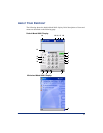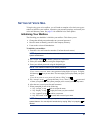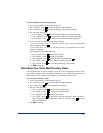
5
Inter-Tel
®
Model 8601 SoftPhone for Pocket PC User Guide
ABOUT VOICE MAIL
Voice mail is an application that is part of the Inter-Tel voice processing system.
Using voice mail, you and other callers can send and receive recorded messages from
any supported endpoint on the system. To use voice mail features, each user (or sub-
scriber) is assigned a mailbox, which usually corresponds to the extension number
assigned to your endpoint. You can, however, have an unassociated mailbox that does
not correspond to an extension. (Unassociated mailboxes are typically used for agents
or other personnel who don’t have a permanent office.)
With your mailbox, you can use personal or system greetings to let callers know if
you are out of town, on a call, etc. If a caller reaches your mailbox, they can leave a
message, hang up, or access an attendant. In addition, if your voice mail administrator
sets up one or more “group lists” of mailboxes, you can send a message to a group of
people by entering one number instead of everyone’s individual mailbox number.
Inter-Tel voice mail systems support the following types of mailboxes:
• Advanced Mailbox: If E-Mail Reader is enabled for your mailbox, you have
access to voice mail, e-mail, and fax messages in your mailbox. You can also cus-
tomize your personal mailbox options, and access advanced messaging features.
See page 41 for information and instructions about using E-Mail Reader features.
For a voice mail flowchart for advanced mailbox users, see page 52.
• Standard Voice Mailbox: This type of mailbox allows you to send and receive
voice mail messages, record personal greetings, and allows you to customize per-
sonal mailbox options. A standard voice mailbox does not allow you to access e-
mail and fax messages. For a voice mail flowchart for standard mailbox users,
see page 59.
NOTE: If you have the Enterprise
®
Messaging (EM) voice mail system, you also have
access to advanced communication and messaging features such as E-Mail Reader
and Automatic Speech Recognition (ARS). For more information about EM, see page 7.


















